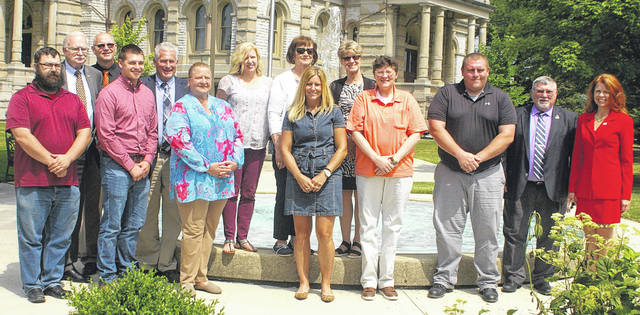
SIDNEY — With each resident missed in the 2020 Census potentially costing the county $1,800 in grants and funds, Shelby County leaders gathered Thursday morning to support efforts to count everyone living in the community.
Employees from the United States Census Bureau visited the Shelby County Annex Building to host a workshop for a local Complete Count Committee that is being formed. The thought is local ambassadors will be better suited than Census employees at the federal and state levels to ensure everyone in their communities is counted.
“It’s extremely important that we get it right,” Chad Stover, a partnership specialist with the United States Census Bureau, said. “We need to know who lives in the United States and here within Shelby County.”
The Decennial Census is mandated by the Constitution and has been compiled every 10 years since 1790 when U.S. Marshals traveled from home to home on horseback to count every resident.
The Census – which can be completed online, by telephone or by mail in 2020 – will be used to distribute more than $675 billion in federal funding to states annually, will be used to determine the number of representatives states have in the House of Representatives and will be used in political redistricting. Government agencies and businesses also use Census data to determine where services are needed.
“The county loses potentially $1,800 per person per year that is missed during the Census, and it’s my goal to make sure we don’t miss anybody,” Shelby County Commissioner Julie Ehemann said.
While most people respond to the Census, some populations are harder to count, Stover said, including transient people, homeless people and frequent renters.
“The majority of people are going to respond,” Stover said. “However, the people that we’re really trying to get to are the people that don’t want to respond or just have different living situations that make it harder for them to respond.”
Complete Count Committees will work to ensure everyone is counted, spreading the message of the importance of an accurate count prior to the April 1, 2020, Census Day and then following up with people who don’t respond.
“We all understand that the federal government, the governments as a whole, may not be trusted,” Stover said. “Where do people get their trust and information from? That’s where this committee is going to come together, and you’re going to realize the different enclaves, the different hard to reach populations that you have in this county that aren’t going to respond to the Census, and then you’re going to come up with a plan on how to get to those people, how to make them understand how important it is to be counted.”
Thursday’s meeting in Shelby County was attended by leaders from city of Sidney, Sidney High School, Shelby County Commissioners’ Office, Shelby County Department of Jobs and Family Services, Shelby County Engineer’s Office, Shelby County Metropolitan Housing, Shelby County Regional Planning, Shelby County United Way, Shelby County Veterans Services, Sidney-Shelby County Chamber of Commerce, Sidney-Shelby Economic Partnership, village of Botkins, village of Fort Loramie, village of Jackson Center, village of Lockington, village of Russia and Workforce Partnership of Shelby County.
They’ll be tasked with reaching everyone in Shelby County, especially the hard to count populations.
“We’ve got a lot of Japanese and Spanish speaking persons in our community so I think they’re going to be a little bit harder to target,” Ehemann said. “So we’re working on those outreach methods. You know we’ve got those individuals who just migrated from Puerto Rico, and they’re just getting settled. So I’ve reached out to the person who helped get them settled, and I know we’ll be coordinating things with her and their church where they have Spanish-speaking Masses.”
The Census seeks to count everyone living in the United States regardless of citizenship or immigration status. Forms will be available in multiple languages, and Census employees speaking dozens of languages will be available to answer phone calls.
While the government is working to ensure everyone is counted, it’s local ambassadors who can really help in their communities, Stover said.
“CCCs speak the language of the communities, and they know how best to reach the residents,” he said. “CCCs help ensure an accurate 2020 Census count. CCCs increase participation in their communities.”


